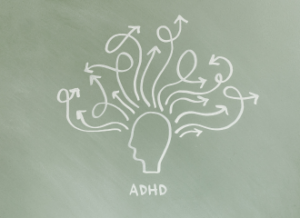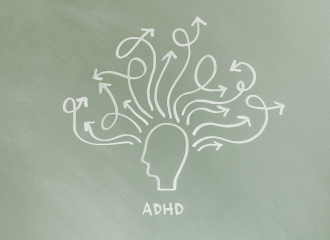Written By: Samantha DeCaro, PsyD
Director of Clinical Outreach and Education at The Renfrew Center
Recovering from an eating disorder can be especially challenging and complex when multiple disorders exist. For example, certain eating disorders often co-occur with Attention Deficit-Hyperactivity Disorder (ADHD) and eating disorder providers must adequately recognize and honor the unique needs of clients navigating both diagnoses. Eating disorder treatment should always be a collaborative and highly individualized process for everyone, but especially for neurodivergent patients. People with ADHD face unique challenges and barriers in both treatment and recovery, but with specialized care and tailored treatment considerations, the process can be a much more supportive and validating experience.
What is ADHD?

Types of ADHD
There are 3 subtypes of ADHD, including Predominantly Inattentive (ADHD-I), Predominantly Hyperactive-Impulsive (ADHD-H), and Combined Inattentive and Hyperactive-Impulsive (ADHD-C). To obtain a diagnosis, a comprehensive evaluation is necessary by a qualified, licensed mental health provider. The assessor gathers information from multiple sources, considers the severity and duration of symptoms, and assesses whether these symptoms are causing impairment in at least 2 settings.
The onset of ADHD usually occurs in childhood, but there may be a variant of the condition when symptoms surface in adulthood. Eating disorders rarely travel alone, and ADHD can be one of the more common co-occurring diagnoses. Research studies have found links between ADHD and certain eating disorders, such as Binge Eating Disorder, Bulimia, and Anorexia Binge/Purge type.
ADHD & Challenges in Eating Disorder Recovery
The symptoms and experiences of ADHD can significantly impact a person on a physical, mental, and behavioral level, making eating disorder treatment and recovery especially challenging. Impairments in executive functioning, impulsivity, sensory issues, and stimulant medication can make the healing process particularly challenging without individualized education, support, strategies, and treatment planning.
Executive Functioning in ED Recovery
Many people with ADHD experience impairments in executive functioning. There are very real differences between an ADHD brain and a neurotypical brain; low levels of certain transmitters and dysfunction in neural pathways can impact planning, organization, attention, and levels of motivation, especially when a task is not immediately rewarding. It can be very difficult for someone with ADHD to start a task. Once started, it can also be difficult to stop or complete it. In eating disorder recovery, engaging in treatment and following a relapse prevention plan often require high levels of executive functioning, such as attending various appointments, completing homework assignments, planning out meals, cooking, and grocery shopping. For someone with ADHD, the various steps required to actively participate in treatment and nourish oneself consistently may be experienced as an overwhelming and harrowing endeavor.
Impulsivity in Eating Disorder Recovery
Many people with ADHD struggle with impulsivity, which can manifest in various ways. Atypical signaling in the “control center” of the brain (i.e., the frontal lobe) impacts various abilities, including problem solving, judgment, and impulse control. For example, when someone has ADHD, the brain has difficulty taking a pause and reflecting on the possible outcomes before acting. The behaviors can cause impairment across various domains and can range from impulsively interrupting others to more severe symptoms, like purging and binge eating.
Interoception and Sensory Differences
Eating disorder treatment often includes improving something called interoceptive awareness. For example, an eating disorder therapist might help you become more aware of your body’s physical cues, like hunger, thirst, and fullness so that you can make informed decisions around eating. Therapy interventions might also include observing how an emotion physically feels in your body. Those with ADHD may experience atypical sensory responsivity, including sensory modulation disorders. In other words, they may experience sensations within and around them differently than their neurotypical peers. For example, a physical sensation like fullness may feel overwhelming and dysregulating. Conversely, they may have tremendous difficulty noticing their body’s cues and may be under-responsive to external stimuli. Regardless of how these sensory issues manifest, eating disorder treatment and recovery can be quite challenging.
Medication for ADHD
ADHD is often treated with central nervous system (CNS) stimulants. These medications inhibit the reuptake of dopamine and norepinephrine, increasing the availability of these neurotransmitters in the brain. Although these medications may help manage impulsivity, improve executive functioning, and reduce hyperactivity, there are various side effects that can have an impact on mental health and eating disorder recovery. Difficulty sleeping, loss of appetite, constipation, nausea, nervousness, and headaches can make it difficult to follow a prescribed meal plan and fully engage in the treatment process. A psychiatrist who specializes in eating disorders can help devise the best medication plan to address ADHD symptoms while also prioritizing eating disorder recovery.
Treating ADHD & Eating Disorders
Although people with ADHD face unique challenges in recovery, tailored support with a specialized treatment team can make a big difference. Education, accommodations, tools, and resources can make the road to recovery a much more supportive, healing and validating space for this population.
Psychoeducation around the intersection of ADHD and eating disorders can help a client better understand their strengths, challenges, and needs. During and after treatment, your client will need to navigate tasks that require persistent planning an effort. An individualized treatment approach should include supporting clients with executive dysfunction. This may include helping clients manufacture enough motivation to engage in tasks, set reminders, reappraise thinking traps, and build in reward systems. For those who struggle with inattention, support may involve offering summaries of sessions or handouts with key bullet points. Breaking overwhelming tasks down into do-able, concrete steps can also be helpful. Identifying the experiences that motivate the ADHD brain can help enhance motivation, such as incorporating novelty, special interests, or a challenge within the recovery process.
Certain treatment accommodations can help with sensory overwhelm and various strategies can help clients navigate sensory under-responsiveness, as well. Strong smells, irritating noises, and clothing textures can turn mealtime or an entire treatment program into an intense and unpleasant experience. It’s important to distinguish between sensory needs and unhelpful behaviors driven by the eating disorder. Approach these issues with curiosity rather than criticism and consider the behavioral patterns prior to the onset of the eating disorder. Non-judgmental, non-leading, open-ended questions throughout the process can reveal challenges and identify unique sensory needs. Identifying and meeting these needs in treatment can improve motivation and lead to a more enjoyable experience in treatment and beyond.
Conclusion
Eating disorder recovery can be daunting for people with ADHD whentreatment programs and interventions are designed by and for neurotypical populations. Neurodivergent clients often face unique barriers throughout the recovery process that can lead to feelings of shame, frustration, and even burnout. It’s important to understand the intersection of these disorders to help clients make sense of their experiences, recognize their strengths, and access the tailored strategies and accommodations that will support them throughout the treatment process.



